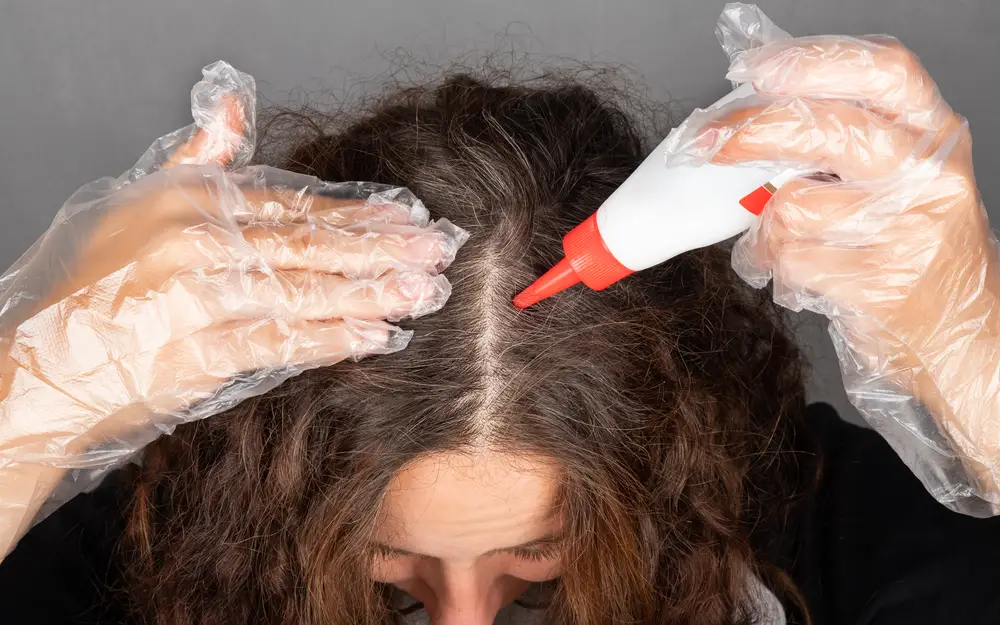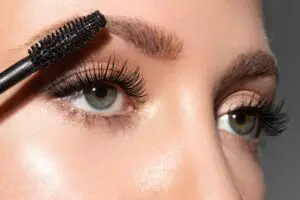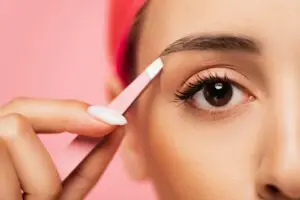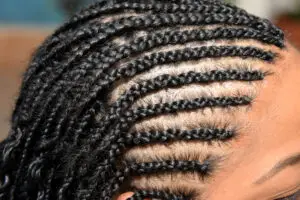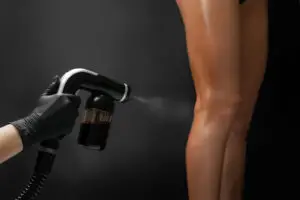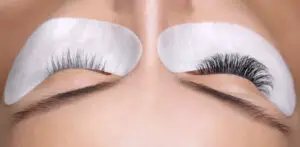Dyeing your hair red can be an exciting and bold choice, but sometimes the results may not turn out as expected or the novelty could wear off. In such cases, knowing how to remove the red pigment effectively becomes essential. Various methods can be employed to get the red out of your hair, and this article will guide you through some of the most effective options to help you achieve the desired outcome.
One popular method for removing red dye from hair is to use a hair colour remover. These products are specifically designed to break down the dye molecules, allowing you to wash away the unwanted colour without causing too much additional strain on your hair.
Hair colour removers can be a safe and effective first step in your journey to getting rid of red hues.
Another tactic you might consider is using a toning shampoo containing cool colours. Green, blue-green, and violet shampoos will help neutralise the red undertones while simultaneously nourishing your hair. Remember to follow the instructions on the specific toning shampoo to achieve the best results.
As you explore these techniques further, you’ll gain a better understanding of the suitable approach for your unique hair type and situation.
Reasons for Red Hair Colour
There are several reasons why people may end up with red hair colour, whether they desire it or not. Understanding the factors that contribute to red hair can help you make informed decisions when seeking to remove or reduce the intensity of the colour. In this section, we will discuss temporary colouring, permanent colouring, and colour fading.
Temporary Colouring
Temporary hair colouring products, such as hair chalks, sprays, and wash-out colours, can impart red tones to your hair. These products typically last for a few washes and are meant to provide a fun and easy way to try a new look without commitment.
However, temporary colours can sometimes leave red remnants in your hair that can be tricky to remove completely, especially if your hair is porous or light in colour.
Permanent Colouring
Permanent hair dyes involve a chemical process that permanently changes the colour of your hair. Red pigments are a popular choice for those looking to make a dramatic change, but the strength of these pigments can be challenging to remove or adjust later on.
The red dye molecules may penetrate deep into the hair shaft, leading to long-lasting red hues that may not be easily removed with colour removers or other at-home methods.
Colour Fading
Even with permanent hair colouring, red pigments may not remain as vibrant over time. Factors such as sunlight exposure, frequent washing, and chemical services like straightening or perming can cause the colour to fade, revealing unwanted red or brassy tones.
Hair products containing sulfates may also accelerate colour fading. Maintaining your desired hair colour may thus require you to regularly reapply dye, use colour-preserving products, or visit a salon for professional touch-ups.
Methods to Get Red Out of Hair
Clarifying Shampoo
One of the easiest ways to remove unwanted red tones from your hair is by using a clarifying shampoo. These shampoos contain sulfates that help strip out chemicals and mineral build-up on your scalp and hair follicles, making them ideal for removing colour.
To use, simply apply the clarifying shampoo to wet hair, lather it up, leave it in for a few minutes, and then rinse thoroughly. Repeat the process if necessary until the desired result is achieved.
Colour Remover
A more targeted method for removing red dye from your hair is using a hair colour remover. These products work by shrinking the colour molecules within the hair shaft, allowing the dye to be washed away effectively.
Follow the instructions on the packaging, paying close attention to the recommended processing time for optimal results. Keep in mind that colour removers may be harsh on hair, so it’s important to condition and treat your hair afterwards to maintain its health.
Baking Soda and Lemon Juice
A natural approach to fading red dye involves mixing baking soda and lemon juice. Create a paste by combining equal parts of baking soda and lemon juice. Apply the mixture to your hair, focusing on the areas with red dye. Let it sit for 15-20 minutes before rinsing with warm water.
This method may need to be repeated several times to achieve the desired results, and it’s important to note that the acidity of the lemon juice can be drying for your hair, so always condition after using this method.
Vitamin C Treatment
Another option is using a vitamin C treatment. Crush a few vitamin C tablets and mix them with your favourite shampoo to create a solution that can help break down hair dye.
Apply the mixture to your hair and let it sit for 15-20 minutes before rinsing thoroughly. This method can be repeated as needed, but make sure to condition your hair afterwards to avoid dryness.
Hair Toner
If you’re looking to neutralise unwanted red tones, a hair toner can be a useful addition to your hair care routine. Toners work by depositing cool-toned pigments onto the hair to counteract any warm tones like red or orange.
Choose a toner that matches your desired hair colour, and follow the instructions on the packaging to achieve the best result.
Be mindful that toners are temporary and will fade over time, so regular use may be necessary to maintain your preferred shade.
Remember, it’s essential to take care of your hair’s health throughout this process, and it might take some time to achieve your desired results. Always consult with a professional hairdresser if you have any concerns or questions about removing red dye from your hair.
Preventing Colour Mishaps
To prevent colour mishaps when dyeing your hair, it’s essential to start with a clear understanding of the process, the products you’re using, and your hair type. This can help you achieve the desired results without the accidental red pigments.
Choose the right product: When selecting a hair dye, opt for a product from a reputable brand. Read reviews and seek professional advice if you’re unsure about the appropriate product. Remember that the [colour on the box] won’t always be identical to the final result on your hair.
Conduct a strand test: Before applying colour all over your hair, do a strand test on a small section of hair, preferably hidden from view. This can give you an idea of how the colour will develop and whether any adjustments are needed to prevent those unwanted red tones.
Understand your hair’s undertones: Know the natural undertones of your hair, as this can significantly impact how a dye reacts with your hair. For example, green shampoos are used for red tones in medium or dark brown hair. By identifying your hair’s undertones, you can select the most suitable toning shampoo to combat any unwanted colours.
Follow the instructions: Always follow the instructions provided on the hair dye packaging or any additional professional guidance. Ensure that you mix the dye correctly and apply it for the recommended time.
Overprocessing or underprocessing your hair can lead to undesired results, including red pigmentation.
Properly care for your hair: After dyeing your hair, use colour-safe shampoos and conditioners to maintain the vibrancy and health of your tresses. Regular deep conditioning treatments and using products tailored for dyed hair can help prevent your hair colour from fading or developing red undertones over time.
By following these steps, you can prevent colour mishaps and unwanted red tones in your hair, helping you achieve the perfect shade you desire.
Professional Help
Seeking professional help is a reliable option when you want to get red out of your hair. Hairdressers and colourists are well-versed in handling hair colour mishaps, and they can recommend the best techniques and treatments for your specific case.
An experienced colourist will assess your hair’s condition and choose the most suitable method for removing the red tone. They might firstly opt for a colour remover, which can effectively strip out unwanted pigments without causing too much damage. While some products can be purchased for home use, it’s best to consult with a professional for optimal results.
Another option your colourist may recommend is a colour correction service. This involves carefully adjusting the hair’s colour using professional-grade products to achieve a more desirable tone. The process might include applying a toner or dye with an opposing hue, such as green or blue, to neutralise the red tones. However, this method requires expertise in colour theory and precise execution, so it’s safer to leave it to the professionals.
In some cases, a professional might suggest pre-colour treatments, such as oleo-plex or bonding treatments, which help to protect the hair’s integrity and prevent further damage during the colour removal process. These treatments can also help to restore the hair’s health after colour correction.
Remember, it’s always better to consult a professional before attempting any at-home remedies, as removing red dye from hair can be a complex process. A colourist will provide tailored guidance to avoid potential damage and ensure the best outcome for your tresses.
Conclusion
Removing red dye from your hair can be a challenging process, but with the right techniques and products, it is possible to regain your natural hue or switch to another colour. One way to do so is to use a hair colour remover designed specifically to lift out unwanted pigments.
Another option is to use a green toning shampoo to counteract red tones in the hair. Green shampoos can be found in most chemists or supermarkets, or you can easily create your own by mixing green food colouring or dye with your regular shampoo.
In some cases, letting your red hair colour naturally fade over time is the gentlest way to restore your original hair colour, especially if you’ve used a temporary dye or rinse.
Patience and repeated shampooing will help speed up the fading process, but be cautious not to overwash or damage your hair in the process.
In conclusion, removing red dye from hair can be achieved through a combination of at-home and professional treatments. Finding the best method for you may involve some trial and error, so it’s essential to remain patient and consult a professional stylist if needed.
With persistence and proper care, you’re sure to achieve the hair colour transformation you desire.

I’m Jennifer a beauty and wellness expert. I believe in promoting a sustainable and healthy lifestyle from within. Helping people feel good is my passion; whether it’s teaching yoga or offering skincare advice.

